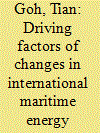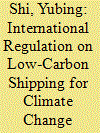| Srl | Item |
| 1 |
ID:
128370


|
|
|
|
|
| Publication |
2014.
|
| Summary/Abstract |
International shipping transports around 90% of global commerce and is of major importance for the global economy. Whilst it is the most efficient and environmentally friendly mode of transport, CO2 emissions from shipping activities still account for an estimated 3% of global emissions. One means of significantly reducing fuel consumption and thereby GHG emissions from shipping are wind propulsion technologies (i.e. towing kites, Flettner rotors and sails) - yet current market uptake is very low. Therefore, the aim of this article is to identify the barriers and drivers for the uptake of wind propulsion technologies. To this end, the theoretical approach of technological innovation systems is adopted. This approach combines structural system components with so-called system functions which represent the dynamics underlying structural changes in the system. The fulfillment of these functions is considered important for the development and diffusion of innovations. Based on newspaper and academic articles, online expert interviews and semi-structured interviews, the level of function fulfillment is evaluated, followed by the identification of structural drivers and barriers influencing function fulfillment. Third, the possibilities to influence these drivers and barriers are discussed.
|
|
|
|
|
|
|
|
|
|
|
|
|
|
|
|
| 2 |
ID:
180106


|
|
|
|
|
| Summary/Abstract |
Emissions have been a critical concern for the shipping sector, calling for climate mitigation measures to be implemented in this field urgently. It is therefore useful to understand the factors that influence the relevant empirical trends so that policies can be better tailored to address the climate challenges. Given the high reliance on fossil fuels, this paper has focused on the energy consumption from international shipping, by examining 6 factors across product types and shipping routes. This is based on comprehensive microdata of almost all vessels in the world over 2014–2017. The study finds that improvements in energy intensity is consistent across product types and shipping routes, reinforcing the importance of energy efficiency as a key climate mitigation measure. However, shifts in freight transport activity across different regions have offset gains in energy efficiency and was the most dominant factor contributing to an increase in energy consumption. Monitoring of the transport structure effect is critical for progress tracking and the potential of this effect to alter energy consumption should also be factored into emission projections.
|
|
|
|
|
|
|
|
|
|
|
|
|
|
|
|
| 3 |
ID:
159407


|
|
|
|
|
| Summary/Abstract |
This article outlines the contribution of international shipping to climate change and examines different approaches to regulate international shipping activities to reduce greenhouse gas (GHG) emissions. It considers challenges such as the allocation of GHG emissions to individual states, the selection of the most effective mitigation and regulatory measures, the potential for a disproportionate burden to fall upon developing states, and the debate about whether the United Nations (UN) or the International Maritime Organization (IMO) is the appropriate international authority to regulate emissions from international shipping.
|
|
|
|
|
|
|
|
|
|
|
|
|
|
|
|